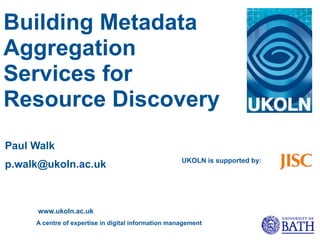
Metadata Aggregation Services
- 1. Building Metadata Aggregation Services for Resource Discovery Paul Walk UKOLN is supported by: p.walk@ukoln.ac.uk www.ukoln.ac.uk A centre of expertise in digital information management
- 2. aggregating metadata 2
- 3. why aggregate metadata? • to address systems/network latency - a cache • supporting resource-discovery • for ‘Web Scale concentration’ • ‘gaming’ Google - raising ‘visibility’ of content • network effects if user facing services also developed • to showcase resources • to create middleman business opportunities • as infrastructure to support 3rd-party services • as an approach to preservation 3
- 4. patterns • harvest from network, aggregate and re-expose • discovery.ac.uk, Europeana, RepUK • collect from offline sources and make available in aggregate on the network • Collections Trust (UK) • harvest without re-exposing, build services on top of aggregation • Google et.al. • expose as a ‘data dump’, or expose through an API 4
- 5. the big question facing data providers: do you want to provide a data service, or just data? 5
- 6. current work in the UK 6
- 7. • a metadata ‘ecosystem’ • aggregation is a major component • preparing resources for aggregation • http://www.discovery.ac.uk 7
- 8. • support innovation • develop some ‘business intelligence’ • develop infrastructure component for services 8
- 10. distribution • state management is a challenge! (deletions, changes) • aggregation of aggregations is consequently non-trivial • e.g. federated models • linking? • should records in an aggregation ever be the target of a link? Or, should such links point to the source? • can/should we make aggregations into Google-friendly targets? • if we succeed with SEO, are we undermining source repositories? • ‘attribution stacking’ data-protocol/) (http://sciencecommons.org/projects/publishing/open-access- 10
- 11. openness and usability • ‘open’ in danger of becoming synonymous with ‘permissively licensed’ • can be both ‘open’ but very difficult to use • needs periodic review - right now SPARQL is barrier to wide adoption • remember all those SOAP interfaces.... • a well supported API might be more open than a completely freely available dump of gigabytes (or more) of data in the sense that it might allow open engagement from more people • we need a richer understanding of openness 11
- 12. in other words... be open, usefully 12
- 13. character encodings.... • huge number of XML records from UK IRs are invalid due to character encoding issues.... • there is a special place in hell for developers who ignore character encodings... http://www.flickr.com/photos/10661825@N07/ 13
- 14. a distributed system is one in which the failure of a computer you didn't even know existed can render your own computer unusable Leslie Lamport are we creating a new version of this with data....? 14
- 15. shifting landscape • Google was previously seen as in opposition to a rich metadata approach... • recall versus precision • Google’s abandonment of OAI-PMH • but now... • Google, Microsoft & Yahoo committed to improving precision through harvesting of Microdata • schema.org and others bridging this divide • so, is there still a need for other ‘concentrations’ or can we rely on the global search engines? 15
- 16. good practice 16
- 17. licensing! • use explicit licenses • this means requiring explicit licenses from sources • if at all possible work with extremely open licenses such as CC0 • in data aggregation, especially when using a Linked Data approach, ‘share alike’ might be easier than ‘attribution’ 17
- 18. “build for normal users, developers and machines” Tom Coates http://www.plasticbag.org/archives/2006/02/my_future_of_web_apps_slides/ 18
- 19. developer-friendly formats • XML has a lot going for it: • very well supported with tools, libraries etc. • well understood & often fits the info models we’re used to • but it has some issues: • validation is a pain and is very often ignored • it’s verbose - it takes up a lot of bandwidth • JSON has gained rapid adoption • less verbose - good for simple client-side manipulation • curl -D - -L -H "Accept: application/rdf+xml" "http://dx.doi.org/10.1126/science. 1157784" • curl -D - -L -H "Accept: application/json" "http://dx.doi.org/10.1126/science.1157784" 19
- 20. service (anti)patterns end-user • design your API to be end-user UI end-user developer-friendly UI UI Future • be aware of what works, and Future 3rd-party 3rd-party dev Future 3rd-party of what appears to work dev dev but actually might not... AP I API AP I • share this understanding some aggregated data of broad interest and potential usefulness = certainty UI = belief = speculation end-user Paul Walk, An infrastructure service anti-pattern http://blog.paulwalk.net/2009/12/07/an-infrastructure-service-anti-pattern/ 20
- 21. expect & enable users to filter - give them feeds (RSS/ Atom) http://www.flickr.com/photos/httpwwwflickrcompeoplenadar/3349883/ (CC BY- NC-ND 2.0) 21
- 22. workshop tomorrow! 22
- 23. tomorrow at 16:15 • (Thursday, 23rd June, 16:15-18:15) • short presentations from UKOLN on LOCAH and RepUK, and from Edina on aggregating services • open discussion on the way forward for metadata aggregation, addressing questions such as: • is Linked Data the future for metadata aggregation services? • do initiatives like Microdata & schema.org reduce the need for our investment in metadata aggregation services? • does usability matter as much as ‘openness’? • please join us, and feel free to bring your own questions & issues to discuss 23
- 24. summing up in a sentence.... 24
- 25. we should use aggregation [applying a tool] to balance the creation of opportunity [building infrastructure] with the solving of problems [developing & providing services] 25
- 26. thank you 26
Notes de l'éditeur
- \n
- \n
- \n
- \n
- \n
- \n
- \n
- \n
- \n
- \n
- \n
- \n
- \n
- \n
- \n
- \n
- \n
- \n
- \n
- \n
- \n
- \n
- \n
- \n
- \n
- \n
